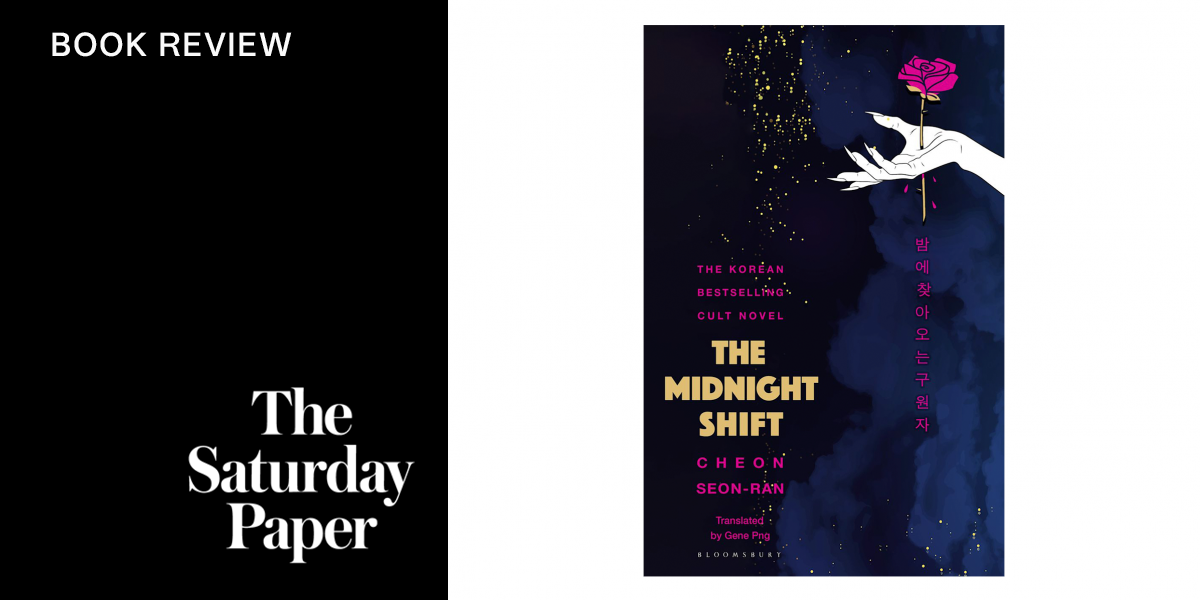What makes life worth living? After a chain of suspicious suicides at a rehabilitation hospital in an abandoned neighbourhood of Incheon, Detective Suyeon is left wondering whether despair or something more sinister is behind the elderly patients’ falls to death.
She finds a figure, Violette, sniffing at the ground where a fourth body was found. The stranger asks why a body that has smashed into the ground would be so drained of blood? She suggests the detective look for two small holes in the corpse’s neck. Vampires exist, Violette tells a sceptical Suyeon, and they lust for the blood of the lonely. Thus begins a vampire murder mystery that is part queer love story and part commentary on loneliness.
Flipping between the past and present, Korean novelist Cheon Seon-Ran’s The Midnight Shift spins three tales of lives marked by encounters with the supernatural: Suyeon’s investigation; Violette’s budding romance with an enchanting vampire, Lily, as a teenager in the 1980s; and Nanju, a night nurse whose violent hatred towards a selfish father fuels a bitter and empty life. All three live emotionally stranded from meaningful connection to the people who surround them, until they each meet a different pale and mysterious figure. However, as the mystery branches out, its various strands of intrigue never fully materialise. Rather, the novel’s heart lies not in the suspense of its mystery but in its exploration of queer pining and love.
Cheon’s tale unfolds where the light does not reach: before the sun rises, in the dripping rain, the shadows of abandoned buildings, with characters who feel alone in the world. In a dreary world laced with icy beauty, the author seems to be asking whether a hopeful death is better than a lonely existence. Cheon’s tightly paced and succinct storytelling in Gene Png’s snappy translation makes for a breezy and thought-provoking read.
A cult novel in South Korea, the narrative examines the loneliness of a modern and marginalised life. Its fast pacing means Cheon’s characters merely brush past brief musings on alienation, without ever delving deeper into the void within that makes living more unbearable than the lure of dying. In one of the victims’ final moments, she longs to reunite with her mother in death. “Will she tell me that I’ve been good?” she wonders. “That I did my best even though I was bored and lonely?”
The scariest thing in the novel, perhaps, is not that vampires could exist among us but rather a loneliness and alienation that is all too familiar.
Bloomsbury, 304pp, $32.99
This article was first published in the print edition of The Saturday Paper on
August 30, 2025 as “Cheon Seon-Ran (translated by Gene Png), The Midnight Shift”.
For almost a decade, The Saturday Paper has published Australia’s leading writers and thinkers.
We have pursued stories that are ignored elsewhere, covering them with sensitivity and depth.
We have done this on refugee policy, on government integrity, on robo-debt, on aged care,
on climate change, on the pandemic.
All our journalism is fiercely independent. It relies on the support of readers.
By subscribing to The Saturday Paper, you are ensuring that we can continue to produce essential,
issue-defining coverage, to dig out stories that take time, to doggedly hold to account
politicians and the political class.
There are very few titles that have the freedom and the space to produce journalism like this.
In a country with a concentration of media ownership unlike anything else in the world,
it is vitally important. Your subscription helps make it possible.
Send this article to a friend for free.
Share this subscriber exclusive article with a friend or family member using share credits.
Used 1 of … credits
use share credits to share this article with friend or family.
You’ve shared all of your credits for this month. They will refresh on September 1. If you would like to share more, you can buy a gift subscription for a friend.
SHARE WITH A FRIEND
? CREDITS REMAIN
SHARE WITH A SUBSCRIBER
UNLIMITED
Loading…


